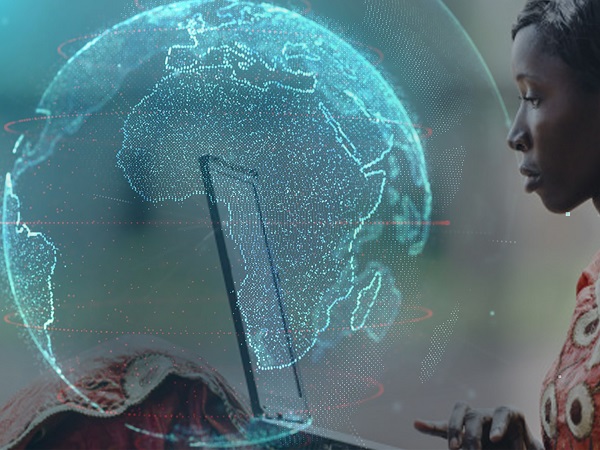The heart of any digital economy is digital infrastructure, including broadband, mobile telecom, and Internet. Africa has recorded tremendous growth in the development of these infrastructure in recent years powered by advancements in subsea cables, terrestrial networks, data centers, cloud services, and satellite providers.
This growth has significantly enhanced connectivity and access to digital services across the continent. According to a report by the Digital Council Africa, the continent experienced the most rapid growth of international Internet bandwidth in 2021, growing at a compound annual rate of 45% between 2017 and 2021.
In Nigeria, Africa’s largest economy, the advancement of digital infrastructure in the last twenty years has transformed the country’s mobile space pushing the number of connected lines in the country from about 400,000 in 2001 to over 200 million as of the end of 2023.
The explosion of mobile technologies, backboned by digital infrastructure, has led to the growth of the country’s tech ecosystem which is dominated by fintechs relying on smartphone penetration. According to the World Bank, extreme poverty in Nigeria and Tanzania declined by about 7% after three or more years of exposure to Internet coverage while labor force participation and wage employment increased by up to 8%.
A 10 per cent increase in mobile Internet penetration could lead to a 2.5 per cent increase in GDP in Africa, the global bank also notes. As digital infrastructure catches on in Africa, millions of individuals have gained access to the Internet and are enjoying access to services such as mobile payments and online learning platforms.
Gaps
While the continent has recorded rapid growth in digital infrastructure, large gaps remain. Africa is behind the rest of the world in terms of fiber network and broadband connectivity, spectrum, and data center processing capabilities.
According to the World Bank, underdeveloped digital infrastructure and, a lack of accessible and affordable connectivity continues to undermine Sub-Saharan Africa’s digital development.
Due to this lack, only about one-third of Africans have access to broadband connectivity, 300 million Africans live more than 50 kilometers from a fiber or cable broadband connection and Africa’s Internet penetration remains at 36%, a lot less than the 62.5% global average.
In a recent visit to Lagos, the US Deputy Secretary of Treasury, Wally Adeyemo, noted, “Ultimately, if there is no access to high-speed internet and information across the country, it is going to limit the potential of the economy to grow.
“So, in addition to investing in companies and helping them grow, we want to make sure that Nigeria has the infrastructure it needs both physical and digital to be able to benefit from entrepreneurs and creativity in the economy.”
Nigeria needs about 120,000 km of fiber optic cables to be laid nationwide for broadband access to improve. As of the latest update, only 78,676 km have been deployed, and most are situated in cities. This digital infrastructural deficit is set to limit the country’s economic growth.
Investments worth $100bn, 80 per cent of which is needed for core infrastructure to establish and maintain broadband networks will be required on the continent, the World Bank notes.
However, the emergence of artificial intelligence as a potentially transformative force is touting a new dimension to Africa’s digital evolution. According to a report by McKinsey & Company, AI could contribute up to $300 billion annually to Africa’s GDP by 2030 while addressing some of the continent’s most pressing challenges, such as improving healthcare outcomes, increasing agricultural productivity, and enhancing financial inclusion.
Infrastructural strides
Subsea Cables: About 99% of global international data traffic runs through undersea cables with the major submarine cable routes connecting North America with Europe and Asia. Although the continent remains underserved, operators and investors have stepped up investments. Undersea fiber-optic cables, connecting the continent to the global Internet backbone have emerged with projects such as the SEACOM, WACS, SAT3, MainOne, Glo1, ACE, and EASSy bolstering international connectivity, reducing latency, and increasing bandwidth capacity. New investments, such as Google’s Equaino and Meta’s 2Africa have increased Africa’s subsea capacity by 324 TBPS, moving the subsea capacity north of 500 TBPS.
Data Centers and Cloud Services: There has been a proliferation of data centers and cloud service providers on the continent due to the growing demand for storage, computing power, and digital services, especially financial services. The African third-party data center market is projected to add $180 billion to its GDP by 2025. International companies like Oracle, Microsoft, Google, and Amazon Web Services have developed cloud capabilities in-continent, while data centers such as Africa Data Center, Open Access Data Center, MainOne, Rack Centre, Medallion in West Africa; Teraco, BCX and Paratus in South Africa; IXAfrica in East Africa and N+One and Etix in North Africa offer local data center services. Africa currently accounts for only 1 percent of global data center capacity, yet has 15 percent of the population. Africa’s data centers also have an estimated <350 MW capacity.
Data centers are physical facilities that house computer systems and associated components, such as telecommunications and storage systems, and are used to store, manage, and disseminate large amounts of data, which are crucial clogs in the functioning of many businesses and organizations. Data centers and cloud services form the backbone of digital infrastructure because they support the delivery of digital products and services.
Challenges of digital infrastructure
A lack of a coordinated funding framework, and extractive mindset by governments on the continent continues to hurt digital infrastructure growth.
In Nigeria for instance, most of the digital infrastructure breakthroughs have been led by privately owned telecommunication firms. Only a few states like Lagos, which continues to shift its completion date, have invested privately in digital infrastructure. But as digital infrastructure assets demand grows, more capital must be deployed by both the government and the private sector to boost accessibility and penetration.
Another crucial component of digital infrastructure is energy, but it remains insufficient on the continent, and continues to slow growth. In places like Nigeria where digital infrastructure run entirely off the grid, energy costs gulp about 40 per cent of operation cost in the digital space. This limits expansion processes and firms spend more on operational costs.
In, South Africa recent outages and load shedding have been disrupting the operation of critical IT systems, data centres, and communication networks, leading to service disruptions and downtime. The daily cost of these disruptions has begun to impede investment and large infrastructure projects in the country.
Closing the gap with AI
There are currently several initiatives targeted at closing the gap on continent. The African Union is carrying out 114 digital infrastructure projects under its Program for Infrastructure Development for Africa to increase affordable broadband access.
The World Bank has committed $731.8 million in Sub-Saharan Africa across 11 Digital Development projects that closed in the past six fiscal years. Under its flagship Digital Economy for Africa initiative, the World Bank has delivered 70 digitalization projects in Africa since 2019 and is aiming to build the foundation of an inclusive digital economy totaling $9 billion across 37 countries.
African countries, including Kenya, South Africa, Uganda, and Lesotho, have created digital strategies to create an enabling environment for digitalization. To improve its development, Togo Digital 2025 framework aims to create a digital ecosystem with a focus on promoting SMEs and women-owned businesses.
Private sector firms, including Amazon, Google, and Microsoft, have also ramped up investments in data centers, and other digital infrastructures, especially in South Africa, Nigeria, Kenya, and Ghana. The United States too has launched several projects in the region including deploying $800 million under the Digital Transformation with Africa initiative of the Biden administration.
All these projects aim to improve the continent’s digital economy. And with the help of the new kid on the block, AI, there is hope that Africa might not need to wait as long anymore.
Technological revolution has come laced with the promise of making lives easier, but none have come anywhere close to the impact Artificial Intelligence is already having. Because of their ability to scale, AI tools have the potential to offset the impact of limited resources and poor infrastructure in the delivery of digital services on the continent.
Already, mobile operators have begun to employ AI at different levels, from improving network operations and customer services to achieving efficiencies and cost savings. When integrated into digital infrastructure on the continent, AI will offer several benefits and capabilities.
The possibilities that AI promises are limitless and can help to overcome many infrastructural challenges by providing new ways of processing and analyzing data, creating more efficient networks, and improving security.
Africa can adopt AI networks to optimize the use of existing infrastructure, by allocating bandwidth more efficiently and identifying and troubleshooting problems in real time. This will help to improve the reliability and speed of Internet connections while reducing wastage. This will plug and optimize infrastructural gaps, ensuring that underserved areas get the most from network infrastructure.
Cloud computing platforms can provide the continent with access to computational resources, especially in areas with limited connectivity. And as data privacy and security becomes a big deal today, AI can be used to leapfrog security infrastructure gaps by detecting and blocking cyber-attacks, and by encrypting data to protect it from unauthorized access.
Other potential benefits of AI include:
- Enhanced Efficiency: AI will enable the automation management of communication networks, allowing for efficient allocation of scarce network resources and proactive identification of potential issues before they escalate ensuring that resources can be effectively deployed.
- Improved Reliability: Through its predictive analytics, AI will allow network operators to anticipate network failures, optimize maintenance schedules, and enhance overall reliability.
- Intelligent Routing: With the help of AI algorithms, network operators in Africa will get the ability to analyze real-time traffic patterns and make intelligent routing decisions, ensuring efficient data transmission and reducing latency.
- Personalized User Experience: AI technologies, such as natural language processing and machine learning, can be utilized in voice assistants and chatbots, providing personalized and real-time support to users.
AI can revolutionize Africa’s infrastructural deficit, but its insatiable appetite for data and processing power challenges traditional data centers will pose a problem. With Africa’s obvious power infrastructure gaps, AI is likely to struggle on the continent.

To meet AI’s unique demands, including massive computational muscle, scalable storage, real-time responsiveness, and unwavering power and cooling. Options that may work for Africa include microgrids; localized energy systems that can operate independently of the main grid; new battery technology, especially lithium-ion batteries, or natural gas generators, thanks to the country’s growing gas deposits. where natural gas reserves totaled over 620 trillion cubic feet in 2021.
Unreliable internet, hardware and software costs, as well as lack of skilled expertise in AI development, deployment and maintenance required for AI implementation can hinder AI’s adoption on the continent.
However, if these issues are resolved, AI could serve as a soothing balm for Africa’s digital infrastructural gap. Leapfrog is a word that has become annoyingly synonymous with Africa’s development, but in this instance, it is a word that offers hope. With AI, Africa can, while expanding its digital infrastructure, make the most of what it has currently to service as many of its population as possible.





